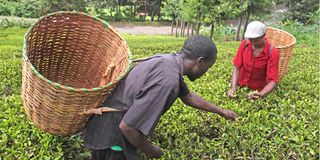Let’s not throw away the baby with bathwater

Farmers pick tea leaves in Nyeri County.
What you need to know:
- The President directed the Ministry of Agriculture to, among other measures, operationalise the proposed Tea Regulations of 2019.
- Tea prices, a matter of heated debate currently, is subject to local, regional and global market forces beyond the control of KTDA or any other player.
Early this year, President Uhuru Kenyatta issued directives to guide the continued transformation of the agricultural sector. Directing that mechanisms be found to improve tea prices, he called for the management of Kenya Tea Development Agency (KTDA) and its subsidiaries and the entire tea marketing chain to be addressed in a bid to improve earnings for farmers.
This included the issues around direct sales versus auctions and the emerging problem of tea hawking.
The President directed the Ministry of Agriculture to, among other measures, operationalise the proposed Tea Regulations of 2019. Agriculture Cabinet Secretary Peter Munya has since unveiled draft regulations 2020 for the tea sub-sector and called for input from stakeholders and the public. But he also made several claims that require interrogation.
First, Mr Munya spoke about tea sales through private treaty, a common practice globally. Indeed, the CS , while extending the term of the Coffee Sector Implementation Committee recently, said he had allocated budgets to promote the direct sale of coffee. So, why direct sale for coffee and not for tea? What is good for the goose is good for the gander!
Lacks transparency
Secondly, he claimed that the Mombasa Tea Auction, the world’s second-largest, is inefficient and lacks transparency and accountability. That poses a danger to Kenya’s tea marketability abroad.
Tea prices, a matter of heated debate currently, is subject to local, regional and global market forces beyond the control of KTDA or any other player. External financial, political and socio-economic factors such as the US sanctions against Iran, a top 10 buyer of Kenya’s teas, affect demand and, hence, prices.
The crisis in Sudan, currency devaluation in Pakistan, inflation in Egypt, political developments in the Middle East , Brexit and the Covid-19 pandemic have all affected Kenyan tea sales.
In the interest of fairness, the media should check the tea prices paid out by other industry players.
Open to reforms
Thanks to recommendations by Sessional Paper No. 2 of 1999, KTDA runs subsidiaries along the tea value chain that provide specialised services at the best-possible rate, hence cost-saving and efficiency. That said, KTDA should be open to reforms. It should appreciate that there are areas of improvement and collaboration for the socioeconomic wellbeing of the smallholder tea farmer.
An industry-wide approach to the challenges facing the tea sub-sector is the only way to get a solution to these challenges. We saw how political meddling ruined the once-booming coffee sector. The sugar industry has almost collapsed following similar interference. The same is true about pyrethrum, once a thriving source of revenue for smallholders
We must not allow this to happen to our tea farmers, who, despite the challenges, still enjoy the best prices compared to other cash crops. However, the envisaged tea reforms shouldn’t throw away the baby with the bathwater.





